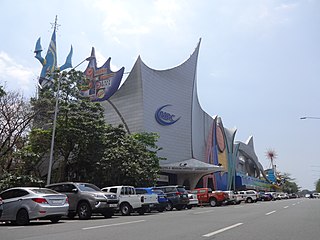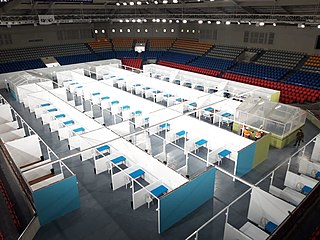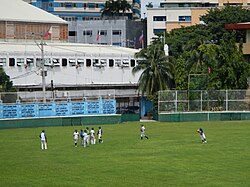
Major League Baseball (MLB) is a professional baseball league and the highest level of organized baseball in the United States and Canada. One of the big four major leagues, MLB comprises 30 teams, divided equally between the National League (NL) and the American League (AL), with 29 in the United States and 1 in Canada. Formed in 1876 and 1901, respectively, the NL and AL cemented their cooperation with the National Agreement in 1903, making MLB the oldest major professional sports league in the world. They remained legally separate entities until 2000, when they merged into a single organization led by the Commissioner of Baseball. MLB is headquartered in Midtown Manhattan.

The University Athletic Association of the Philippines (UAAP), established in 1938, is an athletic association of eight Metro Manila universities in the Philippines. The eight-member schools are Adamson University, Ateneo de Manila University, De La Salle University (DLSU), Far Eastern University (FEU), National University (NU), University of the East (UE), University of the Philippines Diliman (UP), and the University of Santo Tomas (UST).

The Philippine Basketball Association (PBA) is a men's professional basketball league in the Philippines composed of twelve company-branded franchised teams. Founded in 1975, it is the first professional basketball league in Asia and is the second-oldest continuously operating professional basketball league in the world after North America's NBA.

ABS-CBN Corporation is a Filipino media company based in Quezon City, Metro Manila, Philippines. It is the largest radio broadcaster, entertainment television production, program syndication provider and media conglomerate in the Philippines. It is a subsidiary of Lopez Holdings Corporation, which is owned by the López family. ABS-CBN was formed by the merger of Alto Broadcasting System (ABS) and Chronicle Broadcasting Network (CBN).

Radio Philippines Network, Inc. (RPN) is a Philippine television and radio company based in Quezon City. It is currently owned through majority share by Nine Media Corporation of the ALC Group of Companies; along with other stakeholders Presidential Communications Office (PCO) and Far East Managers and Investors Inc., and private sector. The network's main offices and transmitter is located at Panay Avenue, Brgy. South Triangle also in Quezon City. Founded by Roberto Benedicto and prior to its privatization, it was the sister station of current government owned and controlled Intercontinental Broadcasting Corporation and formerly an attached agency of the now-PCO, despite having 20% minority stake in ownership.

Sports in the Philippines is an important part of the country's culture. There are six major sports in the Philippines: basketball, boxing, tennis, football, billiards, and volleyball.

The Manila Broadcasting Company, doing business as the MBC Media Group, is a multimedia company in the Philippines. MBC Media Group is currently owned by the FJE Group of Companies of Fred J. Elizalde, which also operates hotels and Pasay-based amusement park, Star City. Its AM flagship network, DZRH is the oldest radio station in the country while its FM flagship network, Love Radio is the top station in FM radio ratings in Metro Manila and several key cities and provinces.

Basketball is the most popular sport in the Philippines, played on both the amateur and professional levels.

The Philippines national baseball team represents the Philippines in international matches and tournaments. It is organized by the Philippine Amateur Baseball Association.

Dr. Erasmus Arlington "Arlie" Pond was an American Major League Baseball pitcher for the Baltimore Orioles from 1895 to 1898, as well as a doctor in the United States Army during the Spanish–American War and World War I.
Television in the Philippines was introduced in October 1953 upon the first commercial broadcast made by Alto Broadcasting System, making the Philippines the first Southeast Asian country and the second in Asia to do so. Even before that, during the late 1940s, several academic experiments had been done and replicated by Filipino engineers and students.
Vaudeville in the Philippines, more commonly referred to as bodabil, was a popular genre of entertainment in the Philippines from the 1910s until the mid-1960s. For decades, it competed with film, radio and television as the dominant form of Filipino mass entertainment. It peaked in popularity during the Japanese occupation in the Philippines from 1941 to 1945. Many of the leading figures of Philippine film in the 20th century, such as Dolphy, Nora Aunor, Leopoldo Salcedo and Rogelio de la Rosa, began their showbusiness careers in bodabil.

The Rizal Memorial Baseball Stadium is a baseball stadium located inside the Rizal Memorial Sports Complex in Manila, Philippines. It has a seating capacity of 10,000.
These are the sports broadcasting contracts in the Philippines. There are four primary local producers of sport programs in the country: Solar Sports, TAP Sports, GMA Network, and TV5/Cignal TV.

Football in the Philippines is administered by the Philippine Football Federation (PFF), the governing body of football in the country.
The Philippines Women's National Softball Team, nicknamed the "Blu Girls", is the national team of Philippines. They are governed by the Amateur Softball Association of the Philippines. They won a bronze medal in 1970 ISF Women's World Championship in Osaka, Japan and it was their first medal won in a World Championship.
Region R. Ylanan was a Filipino athlete, physician, sports administrator, physical educator, and sports historian. He rose to fame with three gold medals in track and field at the 1913 Far Eastern Championship Games in Manila. He won two further medals at the 1915 Games and also represented his country in baseball at three editions of the tournament.
Ice hockey in the Philippines is a minor but emerging sport.
The Philippines women's national baseball team is the national team of the Philippines which represents the country in women's baseball. It is organized by the Philippine Amateur Baseball Association (PABA).

The COVID-19 pandemic had a significant impact on the conduct of sports in the Philippines affecting both competitive sports leagues and tournaments and recreational sports.















